Các tiêu chí quyết định sự lựa chọn trang thương mại điện tử sử dụng phương pháp đánh giá Fuzzy-Delphi: Nghiên cứu trường hợp tại Việt Nam
Abstract
Vietnam is one of the developing countries that is
approving and bringing e-commerce into an
important element. It leads to the changing the
behavior of users in Vietnam in which people can
use electronic device features to do shopping
activities. Along with the occurrence and
development of E-commerce, customers can have
benefits from diversity of choices but it causes a
fiercer competition among these e-retailers at the
same time. Understanding the criteria that
influence the choice of e-commerce websites is
vital. Hence, the study aims to examine the criteria
affecting the selection of websites of customers by
applying a modified Delphi method and fuzzy
theory. The results illustrate that among 11 factors,
product or service quality is prioritized as
selecting a website, followed by feedback from
previous customers.
Keywords: E-commerce, competition, modified
Delphi method and fuzzy theory.
Tóm tắt
Thương mại điện tử tại Việt Nam đang phát triển
mạnh mẽ. Thương mại điện tử dẫn tới sự thay đổi
thói quen của người tiêu dùng ở Việt Nam khi mà
các hoạt động mua sắm thông qua việc sử dụng
các thiết bị điện tử. Với sự ra đời và phát triển của
các trang thương mại điện tử, người tiêu dùng
ngày càng được hưởng nhiều lợi ích hơn từ việc có
nhiều sự lựa chọn hơn. Đồng thời, chính sự gia
tăng nhanh chóng này cũng tạo ra sự cạnh tranh
gay gắt giữa các kênh thương mại điện tử. Nhận
biết được các tiêu chí quyết định đến sự lựa chọn
các trang website là rất quan trọng. Chính vì vậy,
nghiên cứu thực hiện nhằm mục đích đánh giá các
tiêu chí ảnh hưởng đến việc lựa chọn trang website
của khách hàng bằng cách áp dụng phương pháp
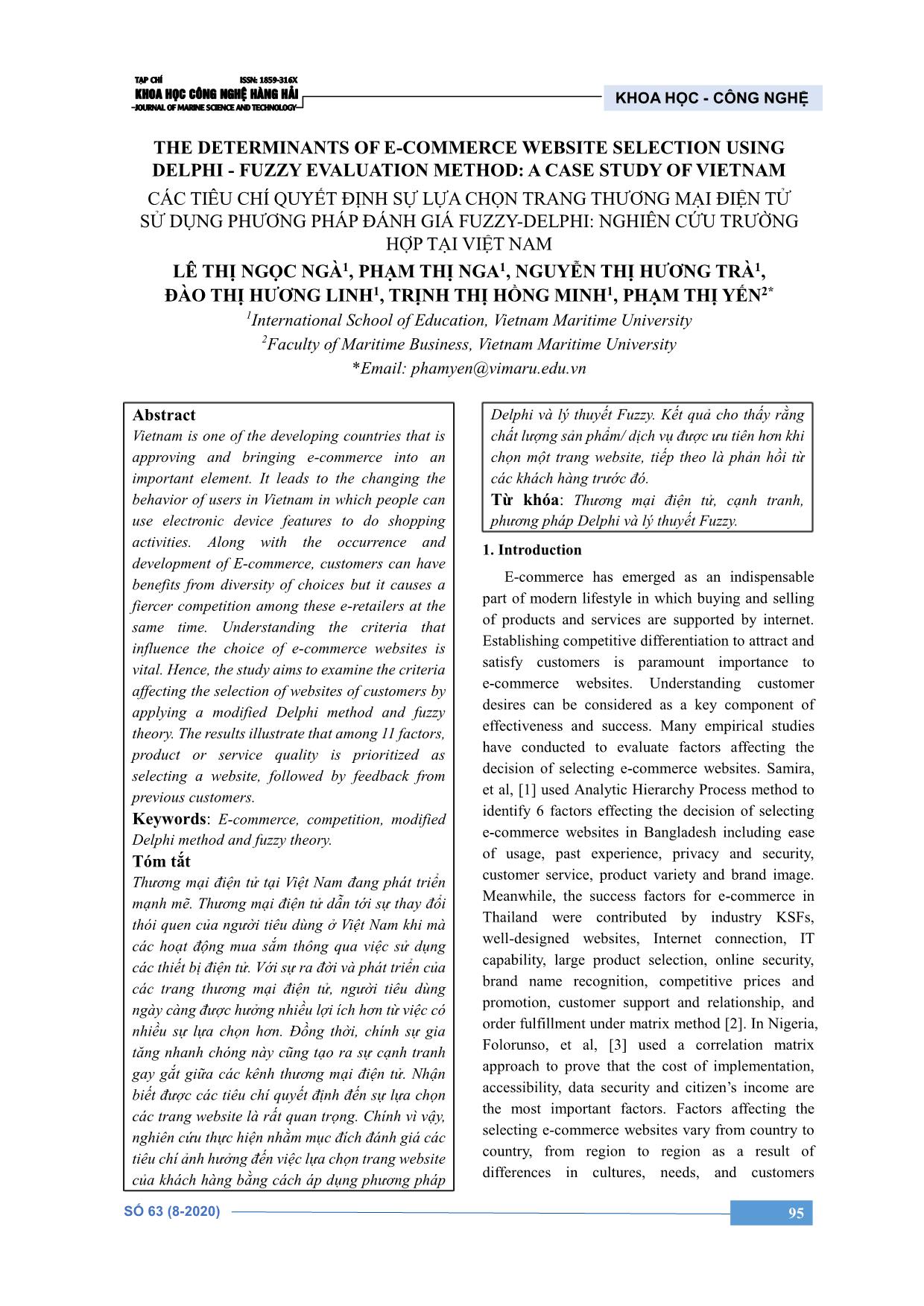
Trang 1
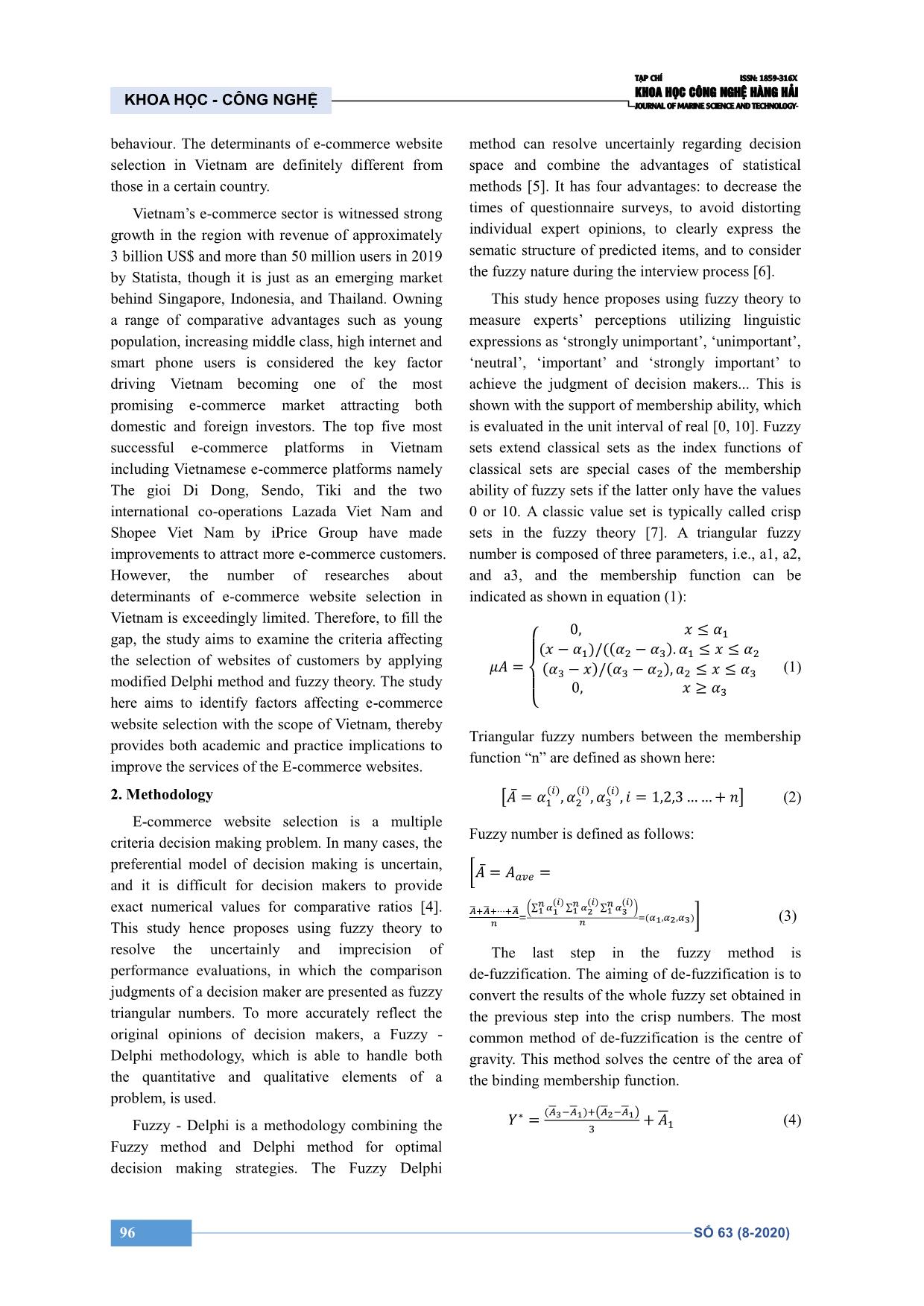
Trang 2
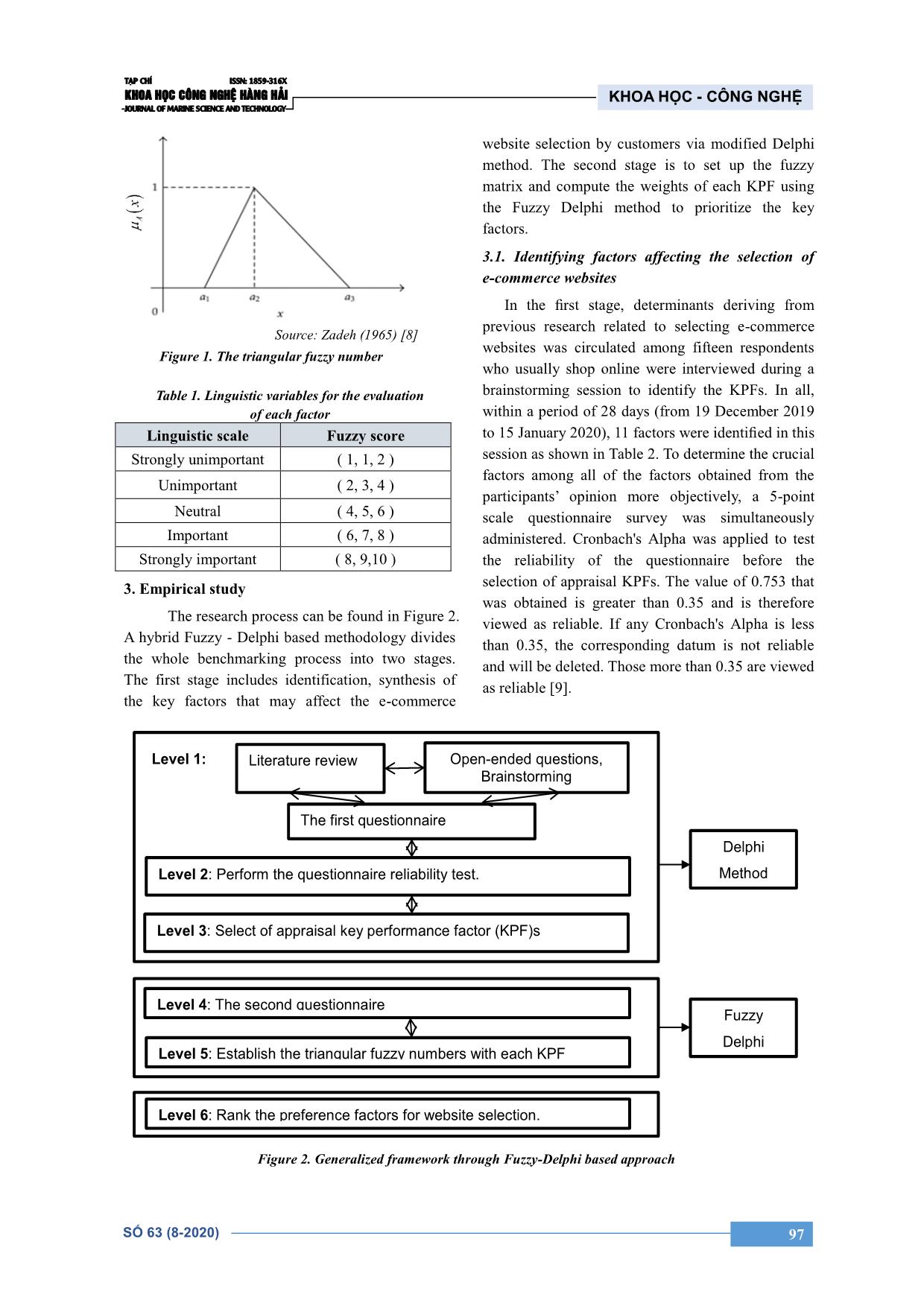
Trang 3
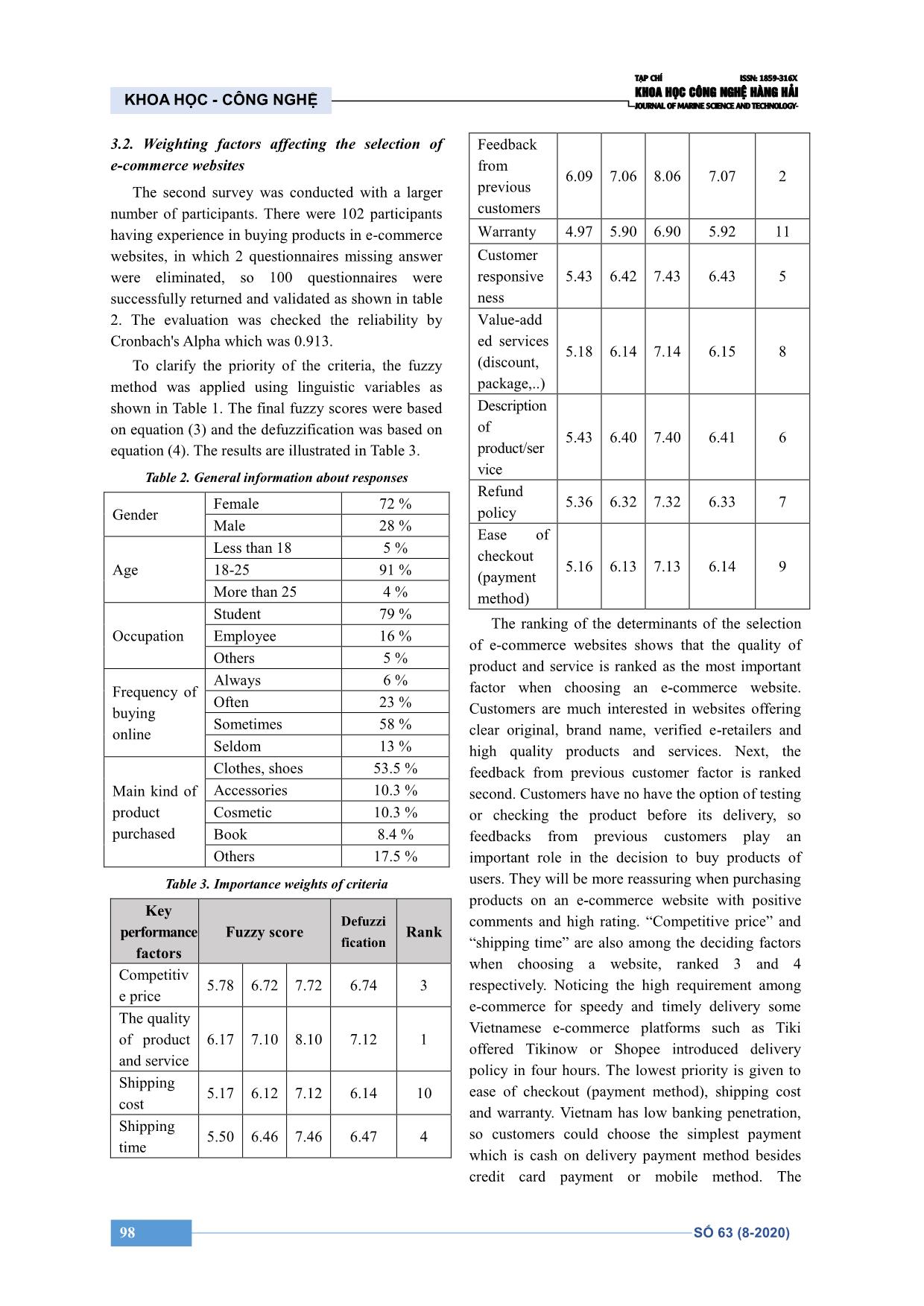
Trang 4
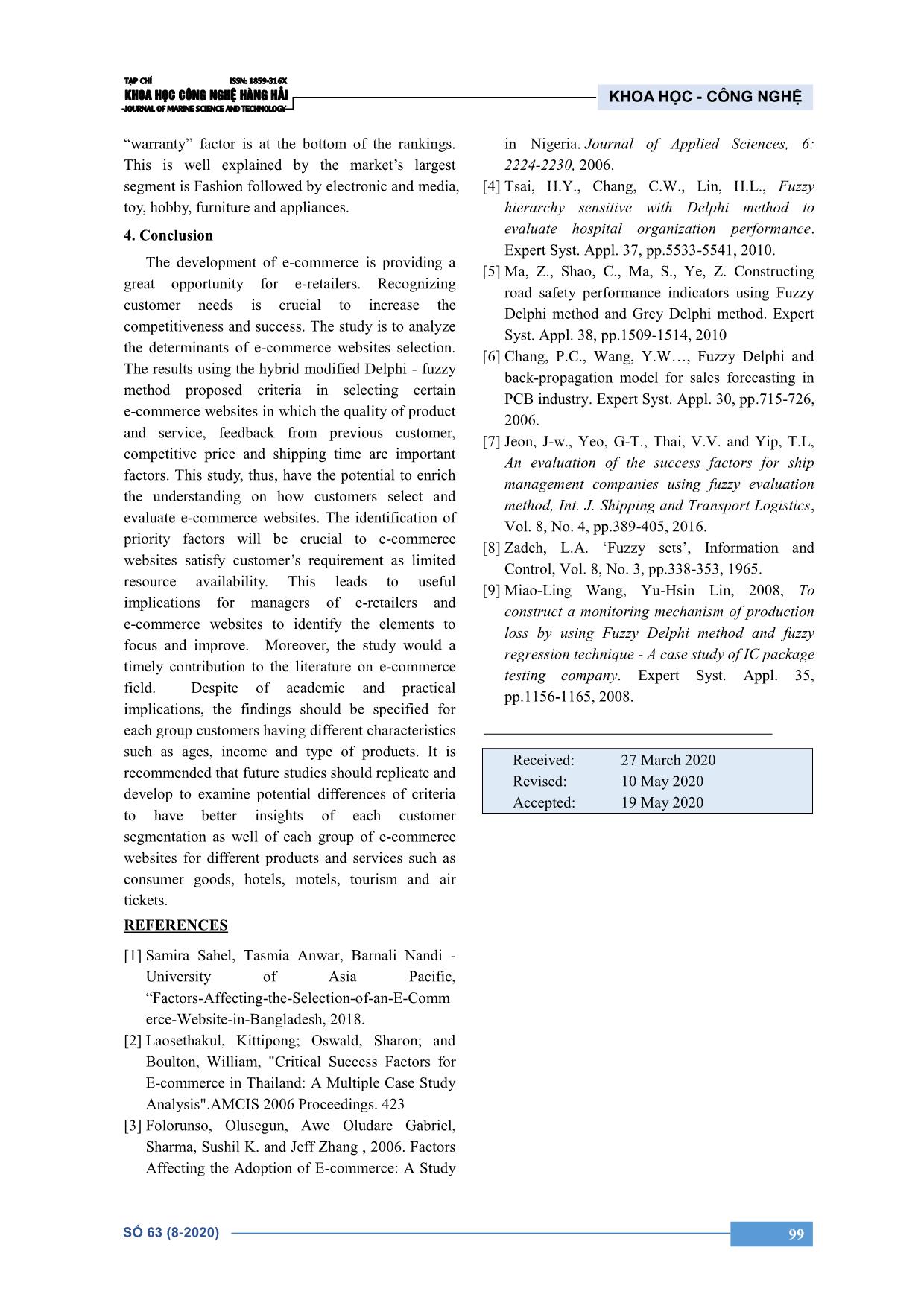
Trang 5
Tóm tắt nội dung tài liệu: Các tiêu chí quyết định sự lựa chọn trang thương mại điện tử sử dụng phương pháp đánh giá Fuzzy-Delphi: Nghiên cứu trường hợp tại Việt Nam
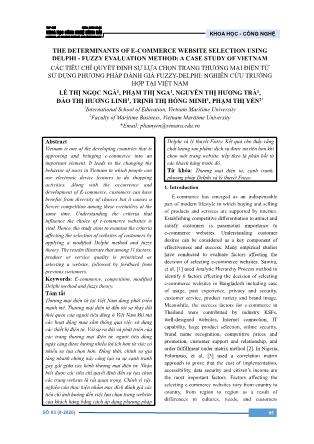
SỐ 63 (8-2020)
KHOA HỌC - CÔNG NGHỆ
95
TẠP CHÍ ISSN: 1859-316X
KHOA HỌC CÔNG NGHỆ HÀNG HẢI
JOURNAL OF MARINE SCIENCE AND TECHNOLOGY
THE DETERMINANTS OF E-COMMERCE WEBSITE SELECTION USING
DELPHI - FUZZY EVALUATION METHOD: A CASE STUDY OF VIETNAM
CÁC TIÊU CHÍ QUYẾT ĐỊNH SỰ LỰA CHỌN TRANG THƯƠNG MẠI ĐIỆN TỬ
SỬ DỤNG PHƯƠNG PHÁP ĐÁNH GIÁ FUZZY-DELPHI: NGHIÊN CỨU TRƯỜNG
HỢP TẠI VIỆT NAM
LÊ THỊ NGỌC NGÀ1, PHẠM THỊ NGA1, NGUYỄN THỊ HƯƠNG TRÀ1,
ĐÀO THỊ HƯƠNG LINH1, TRỊNH THỊ HỒNG MINH1, PHẠM THỊ YẾN2*
1International School of Education, Vietnam Maritime University
2Faculty of Maritime Business, Vietnam Maritime University
*Email: phamyen@vimaru.edu.vn
Abstract
Vietnam is one of the developing countries that is
approving and bringing e-commerce into an
important element. It leads to the changing the
behavior of users in Vietnam in which people can
use electronic device features to do shopping
activities. Along with the occurrence and
development of E-commerce, customers can have
benefits from diversity of choices but it causes a
fiercer competition among these e-retailers at the
same time. Understanding the criteria that
influence the choice of e-commerce websites is
vital. Hence, the study aims to examine the criteria
affecting the selection of websites of customers by
applying a modified Delphi method and fuzzy
theory. The results illustrate that among 11 factors,
product or service quality is prioritized as
selecting a website, followed by feedback from
previous customers.
Keywords: E-commerce, competition, modified
Delphi method and fuzzy theory.
Tóm tắt
Thương mại điện tử tại Việt Nam đang phát triển
mạnh mẽ. Thương mại điện tử dẫn tới sự thay đổi
thói quen của người tiêu dùng ở Việt Nam khi mà
các hoạt động mua sắm thông qua việc sử dụng
các thiết bị điện tử. Với sự ra đời và phát triển của
các trang thương mại điện tử, người tiêu dùng
ngày càng được hưởng nhiều lợi ích hơn từ việc có
nhiều sự lựa chọn hơn. Đồng thời, chính sự gia
tăng nhanh chóng này cũng tạo ra sự cạnh tranh
gay gắt giữa các kênh thương mại điện tử. Nhận
biết được các tiêu chí quyết định đến sự lựa chọn
các trang website là rất quan trọng. Chính vì vậy,
nghiên cứu thực hiện nhằm mục đích đánh giá các
tiêu chí ảnh hưởng đến việc lựa chọn trang website
của khách hàng bằng cách áp dụng phương pháp
Delphi và lý thuyết Fuzzy. Kết quả cho thấy rằng
chất lượng sản phẩm/ dịch vụ được ưu tiên hơn khi
chọn một trang website, tiếp theo là phản hồi từ
các khách hàng trước đó.
Từ khóa: Thương mại điện tử, cạnh tranh,
phương pháp Delphi và lý thuyết Fuzzy.
1. Introduction
E-commerce has emerged as an indispensable
part of modern lifestyle in which buying and selling
of products and services are supported by internet.
Establishing competitive differentiation to attract and
satisfy customers is paramount importance to
e-commerce websites. Understanding customer
desires can be considered as a key component of
effectiveness and success. Many empirical studies
have conducted to evaluate factors affecting the
decision of selecting e-commerce websites. Samira,
et al, [1] used Analytic Hierarchy Process method to
identify 6 factors effecting the decision of selecting
e-commerce websites in Bangladesh including ease
of usage, past experience, privacy and security,
customer service, product variety and brand image.
Meanwhile, the success factors for e-commerce in
Thailand were contributed by industry KSFs,
well-designed websites, Internet connection, IT
capability, large product selection, online security,
brand name recognition, competitive prices and
promotion, customer support and relationship, and
order fulfillment under matrix method [2]. In Nigeria,
Folorunso, et al, [3] used a correlation matrix
approach to prove that the cost of implementation,
accessibility, data security and citizen’s income are
the most important factors. Factors affecting the
selecting e-commerce websites vary from country to
country, from region to region as a result of
differences in cultures, needs, and customers
KHOA HỌC - CÔNG NGHỆ
96 SỐ 63 (8-2020)
TẠP CHÍ ISSN: 1859-316X
KHOA HỌC CÔNG NGHỆ HÀNG HẢI
JOURNAL OF MARINE SCIENCE AND TECHNOLOGY
behaviour. The determinants of e-commerce website
selection in Vietnam are definitely different from
those in a certain country.
Vietnam’s e-commerce sector is witnessed strong
growth in the region with revenue of approximately
3 billion US$ and more than 50 million users in 2019
by Statista, though it is just as an emerging market
behind Singapore, Indonesia, and Thailand. Owning
a range of comparative advantages such as young
population, increasing middle class, high internet and
smart phone users is considered the key factor
driving Vietnam becoming one of the most
promising e-commerce market attracting both
domestic and foreign investors. The top five most
successful e-commerce platforms in Vietnam
including Vietnamese e-commerce platforms namely
The gioi Di Dong, Sendo, Tiki and the two
international co-operations Lazada Viet Nam and
Shopee Viet Nam by iPrice Group have made
improvements to attract more e-commerce customers.
However, the number of researches about
determinants of e-commerce website selection in
Vietnam is exceedingly limited. Therefore, to fill the
gap, the study aims to examine the criteria affecting
the selection of websites of customers by applying
modified Delphi method and fuzzy theory. The study
here aims to identify factors affecting e-commerce
website selection with the scope of Vietnam, thereby
provides both academic and practice implications to
improve the services of the E-commerce websites.
2. Methodology
E-commerce website selection is a multiple
criteria decision making problem. In many cases, the
preferential model of decision making is uncertain,
and it is difficult for decision makers to provide
exact numerical values for comparative ratios [4].
This study hence proposes using fuzzy theory to
resolve the uncertainly and imprecision of
performance evaluations, in which the comparison
judgments of a decision maker are presented as fuzzy
triangular numbers. To more accurately reflect the
original opinions of decision makers, a Fuzzy -
Delphi methodology, which is able to handle both
the quantitative and qualitative elements of a
problem, is used.
Fuzzy - Delphi is a methodology combining the
Fuzzy method and Delphi method for optimal
decision making strategies. The Fuzzy Delphi
method can resolve uncertainly regarding decision
space and combine the advantages of statistical
methods [5]. It has four advantages: to decrease the
times of questionnaire surveys, to avoid distorting
individual expert opinions, to clearly express the
sematic structure of predicted items, and to consider
the fuzzy nature during the interview process [6].
This study hence proposes using fuzzy theory to
measure experts’ perceptions utilizing linguistic
expressions as ‘strongly unimportant’, ‘unimportant’,
‘neutral’, ‘important’ and ‘strongly important’ to
achieve the judgment of decision makers... This is
shown with the support of membership ability, which
is evaluated in the unit interval of real [0, 10]. Fuzzy
sets extend classical sets as the index functions of
classical sets are special cases of the membership
ability of fuzzy sets if the latter only have the values
0 or 10. A classic value set is typically called crisp
sets in the fuzzy theory [7]. A triangular fuzzy
number is composed of three parameters, i.e., a1, a2,
and a3, and the membership function can be
indicated as shown in equation (1):
𝜇𝐴 =
{
0, 𝑥 ≤ 𝛼1
(𝑥 − 𝛼1)/((𝛼2 − 𝛼3). 𝛼1 ≤ 𝑥 ≤ 𝛼2
(𝛼3 − 𝑥)/(𝛼3 − 𝛼2), 𝑎2 ≤ 𝑥 ≤ 𝛼3
0, 𝑥 ≥ 𝛼3
(1)
Triangular fuzzy numbers between the membership
function “n” are defined as shown here:
[�̅� = 𝛼1
(𝑖)
, 𝛼2
(𝑖)
, 𝛼3
(𝑖), 𝑖 = 1,2,3+ 𝑛] (2)
Fuzzy number is defined as follows:
[�̅� = 𝐴𝑎𝑣𝑒 =
�̅�+�̅�+⋯+�̅�
𝑛
=
(∑ 𝛼1
(𝑖)
∑ 𝛼2
(𝑖)
∑ 𝛼3
(𝑖)𝑛
1
𝑛
1
𝑛
1 )
𝑛 =(𝛼1,𝛼2,𝛼3)] (3)
The last step in the fuzzy method is
de-fuzzification. The aiming of de-fuzzification is to
convert the results of the whole fuzzy set obtained in
the previous step into the crisp numbers. The most
common method of de-fuzzification is the centre of
gravity. This method solves the centre of the area of
the binding membership function.
𝑌∗ =
(𝐴3−𝐴1)+(𝐴2−𝐴1)
3
+ 𝐴1 (4)
KHOA HỌC - CÔNG NGHỆ
97 SỐ 63 (8-2020)
TẠP CHÍ ISSN: 1859-316X
KHOA HỌC CÔNG NGHỆ HÀNG HẢI
JOURNAL OF MARINE SCIENCE AND TECHNOLOGY
Source: Zadeh (1965) [8]
Figure 1. The triangular fuzzy number
Table 1. Linguistic variables for the evaluation
of each factor
3. Empirical study
The research process can be found in Figure 2.
A hybrid Fuzzy - Delphi based methodology divides
the whole benchmarking process into two stages.
The first stage includes identification, synthesis of
the key factors that may affect the e-commerce
website selection by customers via modified Delphi
method. The second stage is to set up the fuzzy
matrix and compute the weights of each KPF using
the Fuzzy Delphi method to prioritize the key
factors.
3.1. Identifying factors affecting the selection of
e-commerce websites
In the first stage, determinants deriving from
previous research related to selecting e-commerce
websites was circulated among fifteen respondents
who usually shop online were interviewed during a
brainstorming session to identify the KPFs. In all,
within a period of 28 days (from 19 December 2019
to 15 January 2020), 11 factors were identified in this
session as shown in Table 2. To determine the crucial
factors among all of the factors obtained from the
participants’ opinion more objectively, a 5-point
scale questionnaire survey was simultaneously
administered. Cronbach's Alpha was applied to test
the reliability of the questionnaire before the
selection of appraisal KPFs. The value of 0.753 that
was obtained is greater than 0.35 and is therefore
viewed as reliable. If any Cronbach's Alpha is less
than 0.35, the corresponding datum is not reliable
and will be deleted. Those more than 0.35 are viewed
as reliable [9].
Linguistic scale Fuzzy score
Strongly unimportant ( 1, 1, 2 )
Unimportant ( 2, 3, 4 )
Neutral ( 4, 5, 6 )
Important ( 6, 7, 8 )
Strongly important ( 8, 9,10 )
Figure 2. Generalized framework through Fuzzy-Delphi based approach
Level 1: Literature review Open-ended questions,
Brainstorming
The first questionnaire
Level 2: Perform the questionnaire reliability test.
Level 3: Select of appraisal key performance factor (KPF)s
Delphi
Method
Level 4: The second questionnaire
Level 5: Establish the triangular fuzzy numbers with each KPF
Level 6: Rank the preference factors for website selection.
Fuzzy
Delphi
KHOA HỌC - CÔNG NGHỆ
98 SỐ 63 (8-2020)
TẠP CHÍ ISSN: 1859-316X
KHOA HỌC CÔNG NGHỆ HÀNG HẢI
JOURNAL OF MARINE SCIENCE AND TECHNOLOGY
3.2. Weighting factors affecting the selection of
e-commerce websites
The second survey was conducted with a larger
number of participants. There were 102 participants
having experience in buying products in e-commerce
websites, in which 2 questionnaires missing answer
were eliminated, so 100 questionnaires were
successfully returned and validated as shown in table
2. The evaluation was checked the reliability by
Cronbach's Alpha which was 0.913.
To clarify the priority of the criteria, the fuzzy
method was applied using linguistic variables as
shown in Table 1. The final fuzzy scores were based
on equation (3) and the defuzzification was based on
equation (4). The results are illustrated in Table 3.
Table 2. General information about responses
Gender
Female 72 %
Male 28 %
Age
Less than 18 5 %
18-25 91 %
More than 25 4 %
Occupation
Student 79 %
Employee 16 %
Others 5 %
Frequency of
buying
online
Always 6 %
Often 23 %
Sometimes 58 %
Seldom 13 %
Main kind of
product
purchased
Clothes, shoes 53.5 %
Accessories 10.3 %
Cosmetic 10.3 %
Book 8.4 %
Others 17.5 %
Table 3. Importance weights of criteria
Key
performance
factors
Fuzzy score
Defuzzi
fication
Rank
Competitiv
e price
5.78 6.72 7.72 6.74 3
The quality
of product
and service
6.17 7.10 8.10 7.12 1
Shipping
cost
5.17 6.12 7.12 6.14 10
Shipping
time
5.50 6.46 7.46 6.47 4
Feedback
from
previous
customers
6.09 7.06 8.06 7.07 2
Warranty 4.97 5.90 6.90 5.92 11
Customer
responsive
ness
5.43 6.42 7.43 6.43 5
Value-add
ed services
(discount,
package,..)
5.18 6.14 7.14 6.15 8
Description
of
product/ser
vice
5.43 6.40 7.40 6.41 6
Refund
policy
5.36 6.32 7.32 6.33 7
Ease of
checkout
(payment
method)
5.16 6.13 7.13 6.14 9
The ranking of the determinants of the selection
of e-commerce websites shows that the quality of
product and service is ranked as the most important
factor when choosing an e-commerce website.
Customers are much interested in websites offering
clear original, brand name, verified e-retailers and
high quality products and services. Next, the
feedback from previous customer factor is ranked
second. Customers have no have the option of testing
or checking the product before its delivery, so
feedbacks from previous customers play an
important role in the decision to buy products of
users. They will be more reassuring when purchasing
products on an e-commerce website with positive
comments and high rating. “Competitive price” and
“shipping time” are also among the deciding factors
when choosing a website, ranked 3 and 4
respectively. Noticing the high requirement among
e-commerce for speedy and timely delivery some
Vietnamese e-commerce platforms such as Tiki
offered Tikinow or Shopee introduced delivery
policy in four hours. The lowest priority is given to
ease of checkout (payment method), shipping cost
and warranty. Vietnam has low banking penetration,
so customers could choose the simplest payment
which is cash on delivery payment method besides
credit card payment or mobile method. The
KHOA HỌC - CÔNG NGHỆ
99 SỐ 63 (8-2020)
TẠP CHÍ ISSN: 1859-316X
KHOA HỌC CÔNG NGHỆ HÀNG HẢI
JOURNAL OF MARINE SCIENCE AND TECHNOLOGY
“warranty” factor is at the bottom of the rankings.
This is well explained by the market’s largest
segment is Fashion followed by electronic and media,
toy, hobby, furniture and appliances.
4. Conclusion
The development of e-commerce is providing a
great opportunity for e-retailers. Recognizing
customer needs is crucial to increase the
competitiveness and success. The study is to analyze
the determinants of e-commerce websites selection.
The results using the hybrid modified Delphi - fuzzy
method proposed criteria in selecting certain
e-commerce websites in which the quality of product
and service, feedback from previous customer,
competitive price and shipping time are important
factors. This study, thus, have the potential to enrich
the understanding on how customers select and
evaluate e-commerce websites. The identification of
priority factors will be crucial to e-commerce
websites satisfy customer’s requirement as limited
resource availability. This leads to useful
implications for managers of e-retailers and
e-commerce websites to identify the elements to
focus and improve. Moreover, the study would a
timely contribution to the literature on e-commerce
field. Despite of academic and practical
implications, the findings should be specified for
each group customers having different characteristics
such as ages, income and type of products. It is
recommended that future studies should replicate and
develop to examine potential differences of criteria
to have better insights of each customer
segmentation as well of each group of e-commerce
websites for different products and services such as
consumer goods, hotels, motels, tourism and air
tickets.
REFERENCES
[1] Samira Sahel, Tasmia Anwar, Barnali Nandi -
University of Asia Pacific,
“Factors-Affecting-the-Selection-of-an-E-Comm
erce-Website-in-Bangladesh, 2018.
[2] Laosethakul, Kittipong; Oswald, Sharon; and
Boulton, William, "Critical Success Factors for
E-commerce in Thailand: A Multiple Case Study
Analysis".AMCIS 2006 Proceedings. 423
[3] Folorunso, Olusegun, Awe Oludare Gabriel,
Sharma, Sushil K. and Jeff Zhang , 2006. Factors
Affecting the Adoption of E-commerce: A Study
in Nigeria. Journal of Applied Sciences, 6:
2224-2230, 2006.
[4] Tsai, H.Y., Chang, C.W., Lin, H.L., Fuzzy
hierarchy sensitive with Delphi method to
evaluate hospital organization performance.
Expert Syst. Appl. 37, pp.5533-5541, 2010.
[5] Ma, Z., Shao, C., Ma, S., Ye, Z. Constructing
road safety performance indicators using Fuzzy
Delphi method and Grey Delphi method. Expert
Syst. Appl. 38, pp.1509-1514, 2010
[6] Chang, P.C., Wang, Y.W, Fuzzy Delphi and
back-propagation model for sales forecasting in
PCB industry. Expert Syst. Appl. 30, pp.715-726,
2006.
[7] Jeon, J-w., Yeo, G-T., Thai, V.V. and Yip, T.L,
An evaluation of the success factors for ship
management companies using fuzzy evaluation
method, Int. J. Shipping and Transport Logistics,
Vol. 8, No. 4, pp.389-405, 2016.
[8] Zadeh, L.A. ‘Fuzzy sets’, Information and
Control, Vol. 8, No. 3, pp.338-353, 1965.
[9] Miao-Ling Wang, Yu-Hsin Lin, 2008, To
construct a monitoring mechanism of production
loss by using Fuzzy Delphi method and fuzzy
regression technique - A case study of IC package
testing company. Expert Syst. Appl. 35,
pp.1156-1165, 2008.
Received: 27 March 2020
Revised: 10 May 2020
Accepted: 19 May 2020
File đính kèm:
 cac_tieu_chi_quyet_dinh_su_lua_chon_trang_thuong_mai_dien_tu.pdf
cac_tieu_chi_quyet_dinh_su_lua_chon_trang_thuong_mai_dien_tu.pdf

